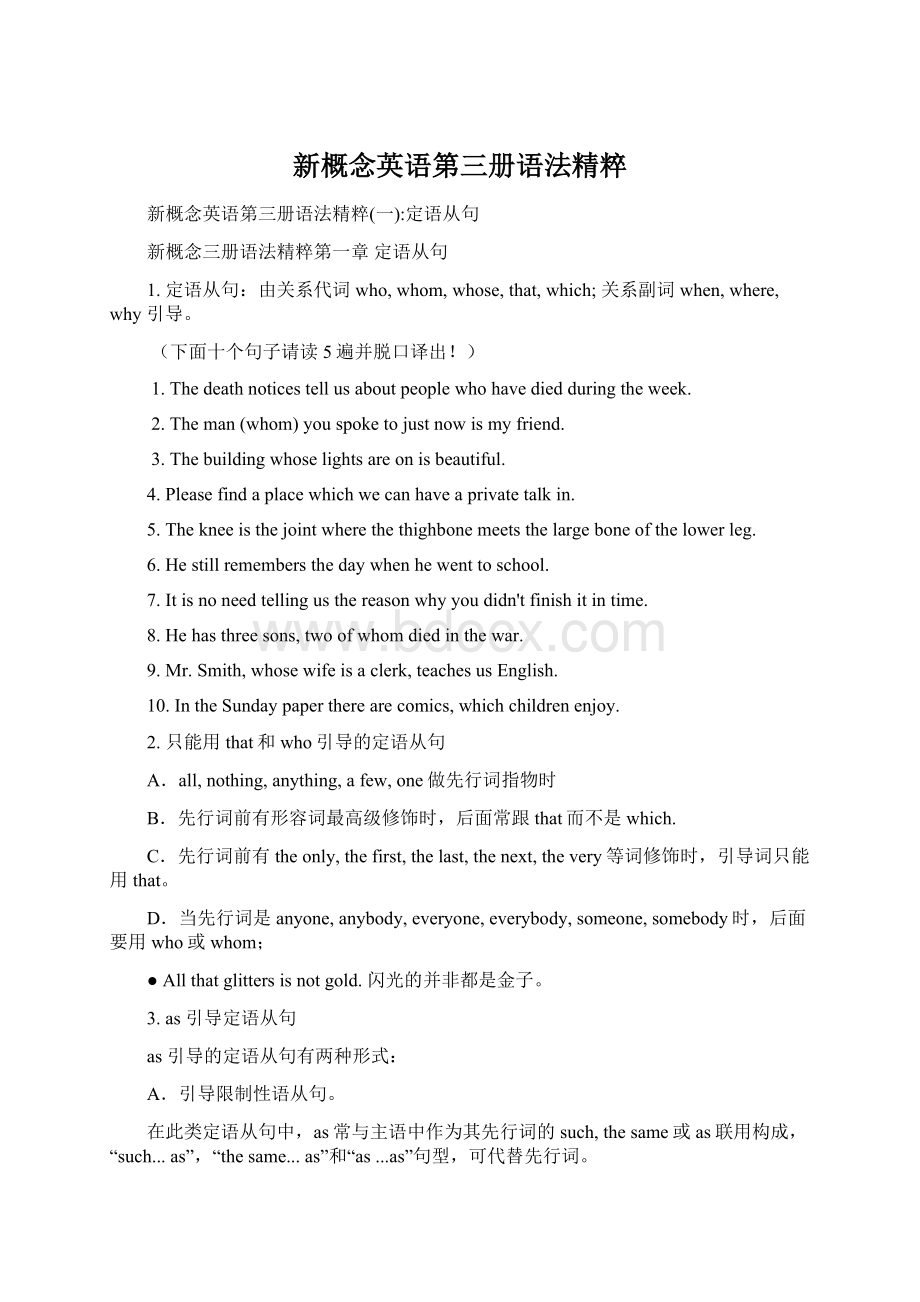新概念英语第三册语法精粹.docx
《新概念英语第三册语法精粹.docx》由会员分享,可在线阅读,更多相关《新概念英语第三册语法精粹.docx(27页珍藏版)》请在冰豆网上搜索。

新概念英语第三册语法精粹
新概念英语第三册语法精粹
(一):
定语从句
新概念三册语法精粹第一章定语从句
1.定语从句:
由关系代词who,whom,whose,that,which;关系副词when,where,why引导。
(下面十个句子请读5遍并脱口译出!
)
1.Thedeathnoticestellusaboutpeoplewhohavediedduringtheweek.
2.Theman(whom)youspoketojustnowismyfriend.
3.Thebuildingwhoselightsareonisbeautiful.
4.Pleasefindaplacewhichwecanhaveaprivatetalkin.
5.Thekneeisthejointwherethethighbonemeetsthelargeboneofthelowerleg.
6.Hestillremembersthedaywhenhewenttoschool.
7.Itisnoneedtellingusthereasonwhyyoudidn'tfinishitintime.
8.Hehasthreesons,twoofwhomdiedinthewar.
9.Mr.Smith,whosewifeisaclerk,teachesusEnglish.
10.IntheSundaypapertherearecomics,whichchildrenenjoy.
2.只能用that和who引导的定语从句
A.all,nothing,anything,afew,one做先行词指物时
B.先行词前有形容词最高级修饰时,后面常跟that而不是which.
C.先行词前有theonly,thefirst,thelast,thenext,thevery等词修饰时,引导词只能用that。
D.当先行词是anyone,anybody,everyone,everybody,someone,somebody时,后面要用who或whom;
●Allthatglittersisnotgold.闪光的并非都是金子。
3.as引导定语从句
as引导的定语从句有两种形式:
A.引导限制性语从句。
在此类定语从句中,as常与主语中作为其先行词的such,thesame或as联用构成,“such...as”,“thesame...as”和“as...as”句型,可代替先行词。
例如:
Wehopetogetsuchatoolasheisusing.我们希望得到他正在用的那种工具。
B.as引导非限制性定语从句时,作用与which相同,as作为关系代词代替整个主句。
(这是语法考试的一个考点。
)
[注意区别]:
as引导的从句用于句首、句中或句后,而which引导的定语从句不能放在句首。
例如:
Asisreported,aforeigndelegationwillvisitthecity.
据报道,一个外国代表团将访问这个城市。
新概念英语第三册语法精粹
(二):
状语从句
新概念英语第三册语法精粹
(二):
状语从句
超级作文联接词及词组,全部拿下!
①原因:
because,since,nowthat(既然)as,for,thisreason....
②结果:
sothat,so,therefore,consequently,soasto,asaresult....
③时间:
after,before,when,while,as,until,assoonas,since,bythetime,once,lately,presently,shortlyafter,currently,atpresent,nowadays...
④条件:
if,onlyif.,once,unless,intheevent(that),incase(that),providedthat,ontheconditionthat,etc.
⑤让步:
though,although,eventhough(if),nomatterwhat/how/when→whatever/however/whenever....
⑥目的:
inorderthat,inorderto,to,
⑦比较:
than,as...as,bycomparison(相比较),bycontrast(相对照)....
新概念英语第三册语法精粹(三):
名词性从句
新概念英语第三册语法精粹(三):
名词性从句
王牌要点:
通常由that或疑问词导出。
1.Howsomemammalscametoliveintheseaisnotknow.(主语从句)
2.Theattorneytoldhisclientthattheyhadlittlechanceofwinningthecase.(宾语从句)
3.Theproblemiswhatwe'lldonext.(表语从句)
4.Wehavenoideathathehascomeback.(同位语从句)
同位语(Appositive):
同位语是英语语法的重点内容,也是各类考试中的一个考点,同时,在写作中正确运用同位语可以使你的句型更加简洁得体。
《新概念英语》第三册第一课有这样一个句子:
WhenreportscameintoLondonzoothatawildpumahadbeenspottedforty-fivemilessouthofLondon,theywerenottakenseriously.
(当伦敦动物园接到报告说,在伦敦以南45英里处发现一只美洲狮时,这些报告并没有受到重视。
)
在这里,awildpumahadbeenspottedforty-fivemilessouthofLondon就是同位语从句,它本来应该放在“reports”后面,这里却被放在了谓语成分cameintoLondonzoo的后面,目的是让句型显得更为稳重。
I.简单记忆:
同位语从句,就是对某些名词做进一步的解释的句子。
IwasgreatlyshockedwhenIheardthenewsthathisfatherdiedyesterday.
(that引导的句子解释了news的内容,注意:
that不做任何成分)
Wehavetofacethefactthattheweatherisunexpectedlybad.
(that引导的句子解释了fact的内容)
I.联想记忆:
能接同位词从句的名词有:
belief(信仰),fact,idea,doubt,rumor(谣言),evidence(证据),conclusion(结论),suggestion(建议),problem,order,answer,discovery(发现)explanation(解释),principle(原则),possibility(可能性),truth,promise(承诺),report(报告),statement(声明),knowledge(知识),opinion(观点),likelihood(可能性)
[大声朗读三遍,背下即可。
]
III.王牌要点:
●同位语一般由that引导,但也可以用关系代词which,who,what和关系副词when,where,why,how或whether引导。
Therearousethequestionwhetherwecouldwinthegame.
Ihavenoideahowtoexplainit.
●一些介词词组后面也能引导同位语从句。
(非常经典之功能句式,可用于四六级和托福作文,不妨一试!
):
ontheassumption(在……前提下),
ontheground(由于……原因),
ontheconditionthat(在……条件下),
withtheexception(有……例外)
owingtothefact(由于……事实);
ontheunderstanding(基于……理解);
Theyoungladypromisedtomarrytheoldmanontheconditionthatheboughtheravilla.
那位年轻的女士答应嫁给那位老头,条件是他给她买一幢别墅。
IV.分隔式同位语从句
为了使句型平衡不至于头重脚轻,有时同位语从句可以放到句子的末尾,(读两遍此定义,然后看倒句:
)
Anideacametohimthathemightwritetohertoaskmoreinformationaboutthematter.
IgotinformationfrommyfriendthattherewillbeamarvelousAmericanmovie"Titanic".
V.同位语从句与定语从句之区别
简单记忆:
定语从句的引导词that或which在句子中用作主语或宾语,而同位语从句的引导词that只起连接主句和从句之作用,不用作任何成分。
示例:
I'vegotananswerthatAisright.(同位语从句,that不做成分)
I'vegotananswerthatsurprisedmealot.(定语从句,that做定语从句的主语)
VI.王牌重点:
可以充当同位语的词组或短语。
1)名词短语。
(使句型更为简洁)
BillClinton,thepresidentofAmerica,cametoChinatopayanofficialvisitin1998.
LuXun,oneofthegreatestessayistsinChina,playedanoverwhelminglyimportantroleinChineseliteraturehistory.
2)动名词词组亦可用作同位语:
别忘了加逗号。
(使句型更为流畅)
I'mcrazyaboutthegame,playingbaseball.
Goingtoconcert,thatsoundsagreatidea.
3)不定式短语。
(陌生只是掌握的开始)
Theproblemwhattodonextremainsunsolved.
Herclaimtohavefinishedhisworkisnothingbutawhitelie.
4)形容词词组。
(有逗号隔开)
Alltheworkers,youngorold,shouldbetreatedequally.
Youngman,shortortall,shouldhavetherighttotaketheopportunity.
VII.同位语的引导词。
(重要!
这是中高级写作中不可缺少的引导成分)
引导词用来表示同位语与它所说明的同位成分之间的关系:
1.namely,thatitis,thatistosay(也就是说),inotherwords(换句话说),or,forshort表示等同关系。
2.suchas,say,sotospeak(譬如说),including(包括),forinstance(或forexample(e.g./eg),表示举例和列举关系。
3.especially,mostly,chiefly,orbetter,inparticular,particularly表示突出重点,(在高难度阅读中表示后面的部分为更重要或更突出的部分,是出题的关键点。
)
新概念英语第三册语法精粹(四):
虚拟语气
新概念英语第三册语法精粹(四):
虚拟语气
虚拟语气用来表达不可能或难以实现的愿望,与事实相反的假设,通常分为基本的三种形式。
1.与现在事实相反的虚拟:
If+did/were+...,...would
should
could +do(动词原形)
might
IfIwereyou,Iwouldgoabroadatonce.(Iamnotyou.)
Ifheknewitnow,hecouldhelpme.(Hedoesn'tknowitnow.)
2.与过去事实相反的虚拟:
If+haddone+...,...would(might)havedone...
IfIhadknownyourtelephonenumberyesterday,Iwouldhavephonedyou.
(Ididn'tknowyourtelephonenumber.)
Ifyouhadcomeherealittleearlierjustnow,youmighthavemether.
(Youdidn'tcomehereearlier.)
3.与将来事实相反的虚拟:
(1)If+should+v.,...would+v.
(可能性很小)(译作“万一”)
Ifitshouldraintomorrow,youcouldstayathome.
IfIshouldfail,whatshouldIdo?
(2)If+did/wereto+v...,would+v.
(完全不可能)
Ifthesunweretoriseinthewest,Iwouldlendyouthemoney.
Ifyoufinisheditin3minutes,Iwouldgiveyoumycar.
4.金牌特殊重点:
!
!
[简单联想记忆]:
●下列动词后的“宾语从句”中需要用虚拟形式,即should+动词原形,shoud在美国英语中要省略(TOEFL语法考点)。
此类常见的动词有:
order,ask,decide,demand,require,recommend,suggest(建议)insist(坚决要求),advise,etc.
例句:
Hesuggestedthatwe(should)helpthemwithEnglish.
Theteacherorderedthatthehomework(should)befinishedwithinhalfanhour.
●下列名词后的同位语从句中要用“should+动词原形”(should可省去)的虚拟。
suggestion, order, request, demand, importance, proposal.
Hemadeasuggestionthatwe(should)haveafancydressparty.
Ithinkitisathingofimportancethatit(should)bedonesoon.
●Itis/wasimportant/necessary/natural/essential/advisable/strange/surprising,ect.+that+主语+should+v.
Itisstrangethatyoushouldsaysuchathing.
Itwasimportantthatyoushouldtellmealltheinformation.
●wish后的宾语从句中,asif后的状语从句中,须用下列的虚拟形式:
主+wish+(that)+主+did/were(指现在)
haddone(指过去)
would+v.(指将来)
IwishthatImetmyunclenow.
IwishIhadmetmyuncleyesterday.
IwishIcouldmeetmyuncletomorrow.
●Itis(high)timethat...+did/were...
Itistimethatyouwenttobed.
●wouldratherthat...+did/were...
Iwouldratherthatyouwerenotherenow.
●wouldsoonerthat...+did/were...
Iwouldsoonerthatyougotupearlier.
Iwouldsoonerthatyouwerenotmybrother.
新概念英语第三册语法精粹(五):
代替与省略
新概念英语第三册语法精粹(五):
代替与省略
英语中,为了避免不必要的重复,经常用so,not,to,do,does代替前面出现的动词或相关内容。
如:
HetranslatedthearticlebetterthanIdid.(did代替wroteit)
—Doyouthinksheisclever?
—Ithinkso.(so代替sheisclever)
(1)从上两例中看出,do/does/did代替动词。
(2)"so与not"代替某个词、短语、句子等,通常用于hope,think,believe,expect,suppose,beafraid,fear,imagine,etc后作宾语。
E.g.—Isitcorrect?
—I'mafraidnot.(notcorrect)
(3)"to"用作不定式,常跟随下列动词:
want,mean,hope,expect,refuse,seem,intend,be,afraid,etc.
E.g.Iaskedhimtogototheparty,butherefusedto.(gototheparty)
(4)"doso,dothat,doit"用来代替动态动词,而不能代静态动词。
Eg.—HegaveupstudyingEnglish.
—Whydidhedoso?
(=giveupstudyingEnglish)
—Thedishtastesnice.
—Yes,soitdoes.(tastesnice)
(此句不能用itdoesit或itdoesso,因taste属静态动词。
(5)为使语言精炼,避免不必要的重复,对话中常用省略形式。
E.g.—Heisthinkingofbuyingacar?
—Ishe?
(这里,“thinkingofbuyingacar”被省略了。
)
—Willhecomebackintime?
Perhaps.(省略了hewillcomebackintime.)
新概念英语第三册语法精粹(六):
倒 装
新概念英语第三册语法精粹(六):
倒装
根据语法要求,把谓语动词置于主语前,称为完全倒装,把助动词或情态动词置于主语前,称为部分倒装。
1.副词如:
in,out,down,there,here,off,over,away,etc.句子倒装。
(完全倒装,但主语不能是代词)
Downjumpedthemurdererfromthetenthfloor.
IncameMissGreen.
(特别注意:
当主语是人称代词时不倒装。
)
Awayshewent!
(她走了!
)
Hereyouare!
(你在这儿!
)
2.only+副词(介词短语)位于句首,句子要倒装。
Onlythendidherealizethathewasmistaken.
Onlybyworkinghardcanwesucceedindoinganything.
3.well,so,often,such,few,little放于句首,句子形成倒装。
Sofinewastheweatherthatweallwentoutlyinginthesun.
WelldidIknowhimandwelldidheknowme.
4.否定词或具有否定意义的词及词组用在句首时,句子须倒装。
此类词有:
neither,nor,hardly,scarcely,rarely,seldom,not,never,notonly,barely,atnotime,nowhere等。
e.g.—Jackcouldnotswim.
—NeithercouldTom.
NeverhaveIseensuchagoodmovie.
5.as引导让步状语从句,须倒装。
(准确地说,是将需要强调的词提到as的前面。
)